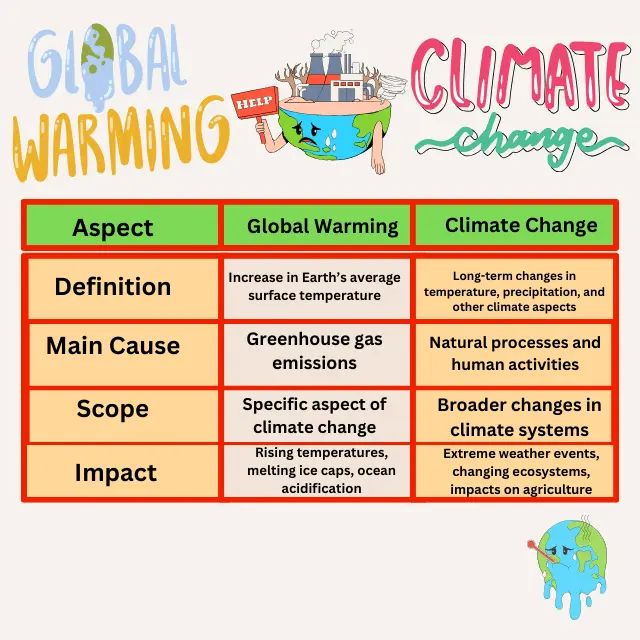Global Warming and climate change are two terms that are used interchangeably, but they refer to two distinct but they are same. In this blog, we will explore the differences between global warming and climate change, as well as the underlying causes of these environmental issues.
What is Global Warming?
Global warming refers to the long-term increase in the Earth’s average surface temperature, which has been observed over the past century. This increase in temperature is primarily caused by the greenhouse effect, which is the trapping of heat in the Earth’s atmosphere by greenhouse gases, such as carbon dioxide, water vapor, and methane. These gases act like a blanket, preventing the heat from escaping into space and causing the Earth’s temperature to rise.
The greenhouse effect is a natural process that helps to regulate the Earth’s temperature, but human activities, such as the burning of fossil fuels and deforestation, have led to an increase in greenhouse gas concentrations in the atmosphere. This increase in greenhouse gases has enhanced the greenhouse effect and contributed to global warming.
Cause of Global Warming
1. Burning of Fossil Fuels: The combustion of coal, oil, and natural gas for energy and transportation releases significant amounts of CO₂.
2. Deforestation: Trees absorb CO₂, and cutting them down reduces the planet’s capacity to sequester carbon, increasing atmospheric CO₂ levels.
3. Agricultural Practices: Activities like rice cultivation and livestock farming produce methane, a potent greenhouse gas.
4. Industrial Processes: Certain industrial activities release various greenhouse gases as by-products.
Impact of Global Warming
1. Temperature Rise: Increased temperatures can lead to heatwaves, altered weather patterns, and disrupted ecosystem.
2. Melting Ice Caps and Glaciers: Higher temperatures cause polar ice to melt, contributing to sea-level rise.
3. Ocean Acidification: Excess CO₂ is absorbed by oceans, leading to acidification that affects marine life.
What is Climate Change?
Climate change refers to the long-term changes in the Earth’s climate, including changes in temperature, precipitation patterns, and weather events. While global warming is one aspect of climate change, it is not the only factor contributing to these changes. Other factors that contribute to climate change include natural factors such as volcanic eruptions, changes in solar radiation, and ocean currents, as well as human activities such as deforestation and land-use changes.
Climate change has several impacts on the environment, including rising sea levels, more frequent and severe weather events such as hurricanes, droughts, and heat waves, as well as changes in ecosystems and biodiversity. These impacts can have far-reaching consequences for human societies, including food and water insecurity, displacement, and health risks.
Cause of Climate Change
1. Natural Factors: Volcanic eruptions, solar radiation variations, and natural greenhouse gas fluctuations can influence the climate.
2. Human Activities: Besides contributing to global warming, activities like urbanization and land-use changes affect climate patterns.
Impacts of Climate Change
1. Changing Weather Patterns: Climate change can lead to more intense and frequent extreme weather events, such as hurricanes, droughts, and floods.
2. Shifts in Ecosystems and Wildlife: Altered climates can affect habitats, leading to changes in biodiversity and species distribution.
3. Impact on Agriculture: Changes in temperature and precipitation can affect crop yields, posing challenges for food security.
Comparing Global Warming and Climate Change
While global warming specifically refers to the rise in global temperatures primarily due to human activities, climate change covers a wider array of changes in the Earth’s climate system. Here’s a quick comparison to highlight the key differences:

Conclusion
Understanding the distinction between global warming and climate change is essential for grasping the complexity of environmental issues our planet faces. Global warming is a significant driver of climate change, but climate change encompasses a broader range of changes and impacts. Addressing these challenges requires a comprehensive approach, including reducing greenhouse gas emissions, enhancing climate resilience, and promoting sustainable practices.
By recognizing the differences between these terms, we can better appreciate the urgency of taking action to protect our planet for future generations.
